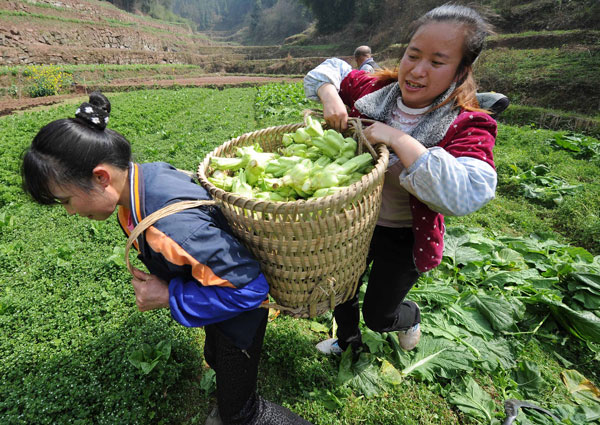Family farms plant seeds for prosperity
Updated: 2013-04-01 07:48
By Xie Yu (China Daily)
|
||||||||
Attractive option
However, things may be about to change, according to Xu Aifang, deputy director of the Agriculture Office of Yexie town, Songjiang district.
"The key point in tackling the (labor shortage) problem remains how to raise farmers' incomes. Once people discover that farming brings a much higher return than working in a factory, it will become a more attractive option," said Xu.
A long-running, but little known, pilot scheme called "Family Farms" is starting to reshape the agricultural demographic.
 |
|
Farmers harvesting vegetables at their family farm in the Wanzhou district of Chongqing. Li Jian / Xinhua |
Under the scheme, a qualified rural family can sign a contract with the village authorities and rent the management rights to a large area of arable land from other families for more than three years.
"Specifically, a 'family farm' is owned by one family. The phrase also refers to a farm that's quite large, ranging from about seven to 10 hectares, and where family members provide most of the manpower," said Xu.
Dang Guoying, a senior researcher with the Institute of Rural Development under the Chinese Academy of Social Sciences, said, "Under good market conditions, the main restriction on a farmer's income depends on the scale of agricultural production. In other words, the family manpower on farms outside the program often fails to fulfill the full potential. Increasing each farmer's agricultural scale would put more people to work and could steadily improve the standard of living for rural people."
Official backing
Although the program has been in limited use for several years, it recently won official backing. In January, China's first policy document of the year - known as the No 1 central policy and regarded as a weather vane for the annual agriculture policy - mentioned the term "family farm" for the first time.
The government will now formulate a wider range of policies to accelerate rural land transfers and grant higher subsidies to large-scale landholders, family farms and rural cooperatives, to encourage the establishment of bigger, specialized farming units, according to the document.
Meanwhile, during his first news conference after taking office, Premier Li Keqiang also stressed the rapid development of "moderate-scale management" to improve farmers' incomes.
In addition to Shanghai, where the concept originated in 2007, local authorities across the country are now exploring the family farm model.
- Farmers become migrant workers to boost pensions
- Farmers grow organic watermelons to order
- Pig farmer deputy keeps one eye on life at home
- Farmer pays tax tribute to Wen
- China stresses farmers' property rights in land transfers
- How to feed China as farmers move to cities
- Strong voice of the farmers
- Farmers need patience for improved legislation
- Cooperative sows seeds of hope for farmers
- Liaoning care centers benefit farmers

 Li Na on Time cover, makes influential 100 list
Li Na on Time cover, makes influential 100 list
 FBI releases photos of 2 Boston bombings suspects
FBI releases photos of 2 Boston bombings suspects
 World's wackiest hairstyles
World's wackiest hairstyles
 Sandstorms strike Northwest China
Sandstorms strike Northwest China
 Never-seen photos of Madonna on display
Never-seen photos of Madonna on display
 H7N9 outbreak linked to waterfowl migration
H7N9 outbreak linked to waterfowl migration
 Dozens feared dead in Texas plant blast
Dozens feared dead in Texas plant blast
 Venezuelan court rules out manual votes counting
Venezuelan court rules out manual votes counting
Most Viewed
Editor's Picks

|

|

|

|

|

|
Today's Top News
Boston bombing suspect reported cornered on boat
7.0-magnitude quake hits Sichuan
Cross-talk artist helps to spread the word
'Green' awareness levels drop in Beijing
Palace Museum spruces up
First couple on Time's list of most influential
H7N9 flu transmission studied
Trading channels 'need to broaden'
US Weekly

|

|








